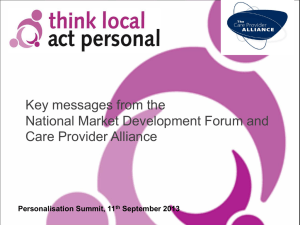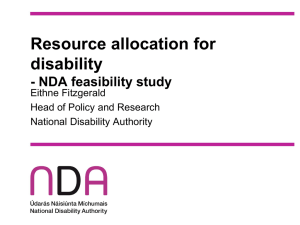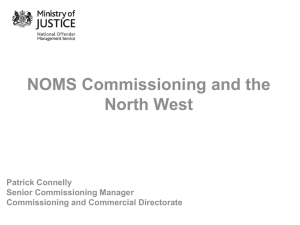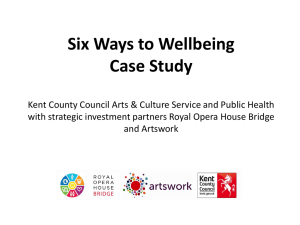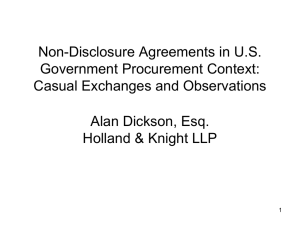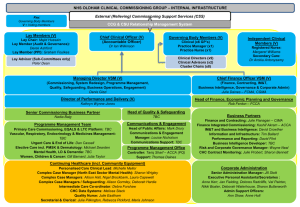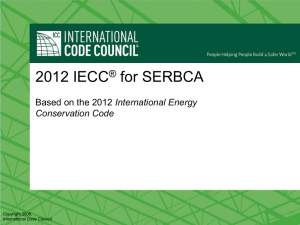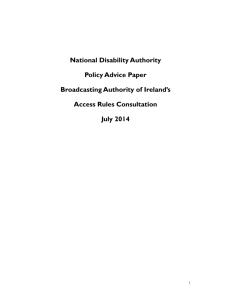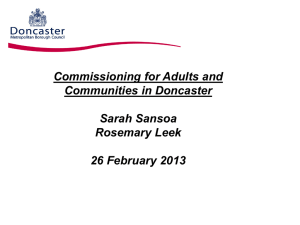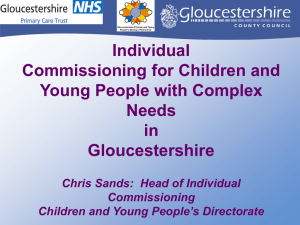NDA Consultation on Commissioning of Disability Services
advertisement
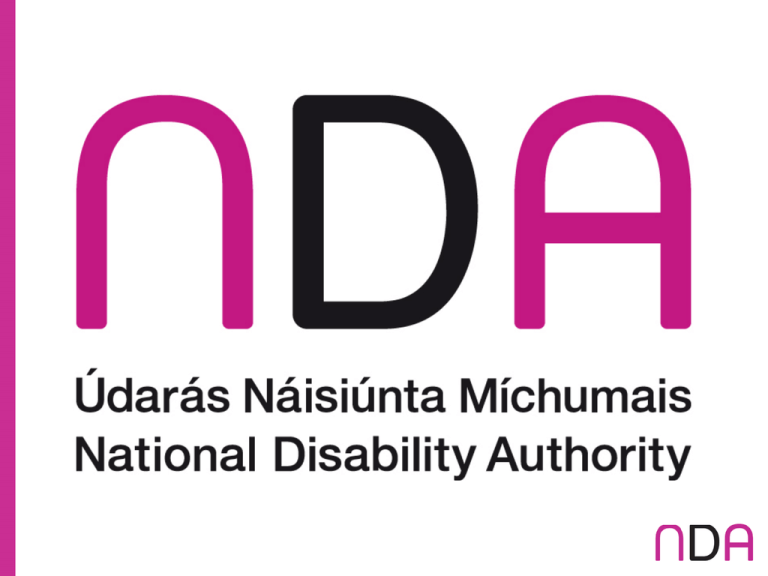
NDA Consultation on Commissioning of Disability Services Presentation to NDA seminar on Commissioning - 30th of September 2011 The National Disability Authority is the independent state body providing information and advice on disability policy and practice to the Minister, and promoting Universal Design in Ireland NDA work on disability services funding • NDA Review of Disability Service Systems, 2010 o Three basic funding mechanisms identified in jurisdictions reviewed as part of NDA 6 country review of disability services, 2010 Block funding Commissioning Direct Payments & Personal Budgets • Ongoing NDA work on disability service system funding o Personal budgets & resource allocation o Commissioning NDA work on commissioning to date • “Preliminary view” paper circulated (August) • Initial analysis of observations completed (September) • Seminar with UK experts (September) o Sue Lloyd Selby, Senior Project Manager, Value Wales, Welsh Assembly o Alyson Dunn, Director of Development at Praxis Care in Northern Ireland o Ian Hood, Coordinator of Learning Disability Alliance Scotland Responses to “preliminary view” paper on commissioning • 20 responses as of the September 29th • 6 individuals • 7 service user or disability representative organisations • 7 provider organisations (including two provider umbrella bodies and one private provider) • Some organisations have indicated that they will submit late responses Main advantages of commissioning Service user views o Ensure service provision reflects the needs & views of service users o Provide service users with more choice and control o Focus on quality, person-centred services & personal outcomes o Drive personalisation of services & personal budgets Service Provider Views o o o o o o o o More transparency and accountability Opportunity to expand / diversify Greater focus on service quality and more choice for service users Local service provision more closely linked to local needs Shift resources from poor performers / inappropriate models Force providers to examine their provision and “up their game” Closer relationship between funders & service users Better control of public expenditure Main disadvantages of commissioning Service user views o Create environment of uncertainty for service users, at least initially o Divert resources to application writing and compliance work o Possible rise in service provision costs o Fragmentation of responsibility for service provision Service provider views o Introduce time-consuming bureaucratic processes o Create short -term and possibly ongoing anxiety for service users o Could favour large, low-cost, for-profit providers – or even to more institutionalised / congregate provision o Periodic renegotiation of contracts, even for very high-quality providers, which will threaten providers’ ability to plan for future o Lead to less skilled, less professionalised workforce o Could reduce service user choice Risks associated with commissioning Service user views o o o o o Focus on price, leading to diminished service quality Absence of commissioning skills within statutory sector Become a bureaucratic process that changes nothing “cherry picking” of certain services which leads to service gaps Commissioning contracts may not cover “soft” but vital supports Service provider views o o o o o o o Contract “cherry picking” leading to service gaps in rural areas Expertise and independence of commissioners Failure to align with other initiatives (Standards, CS, ADS, PBs) Could reduce service user choice by favouring “big battalions” Commissioner may be too powerful vis-à-vis providers Absence of national quality assurance system Industrial Relations and implications of TUPE requirements Critical issues to get right Service user views o System of assessment of service users’ needs o Role and function of commissioner – should they be in health sector? should commissioning & procurement be separated? o Service user involvement in commissioning process o Balance between specifying service requirements & flexibility Service provider views o o o o o o o o Transparency and evidence base of commissioning process Balance between price and quality / innovation / individualisation Appropriate support / brokerage services for service users Recognition of holistic nature of support provision “True” contracting culture (sanctions for breaches by either party) Appropriate parameters of competition / negotiation processes Establishing a common understanding of what “quality” means Quality assurance systems Open Discussion Next steps & closing remarks • All submissions (subject to permission) and accompanying analysis published to NDA website (October 2011) • Report of seminar proceedings published to NDA website (October 2011) • This will inform NDA advice to the Minister Light Lunch
